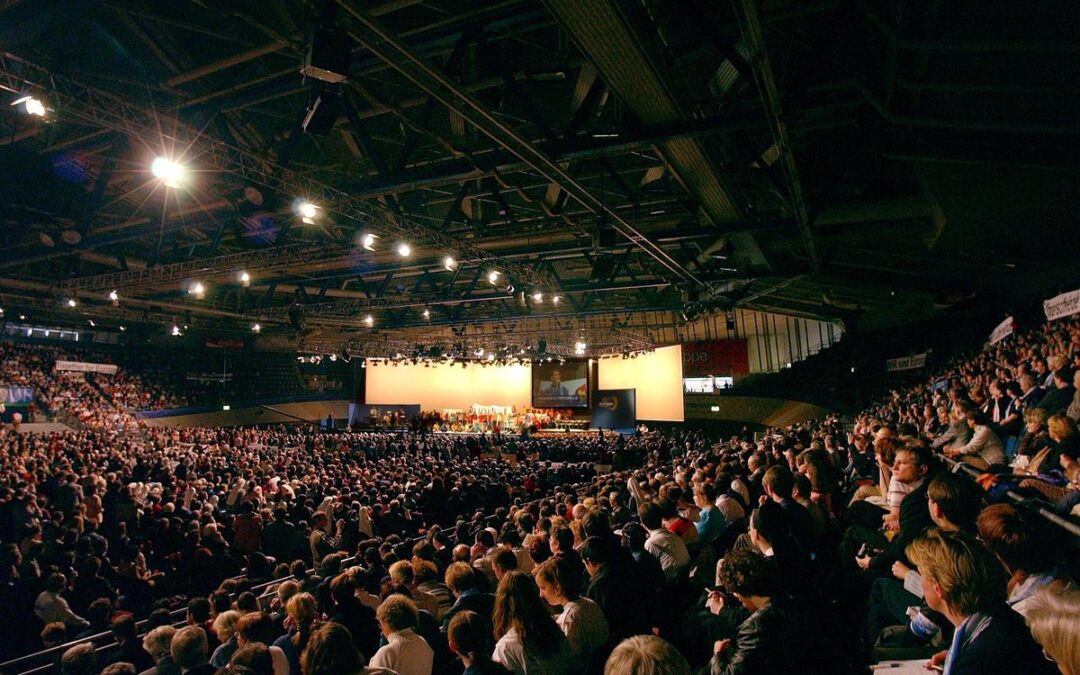
Nov 10, 2018 | Focolare Worldwide
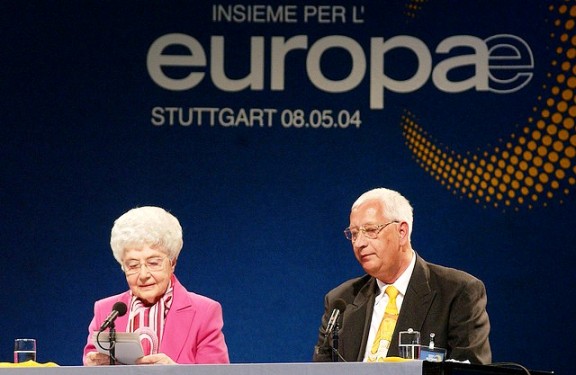 «Universal brotherhood was also the project of people who were not motivated by religious motives, but simply by the desire to benefit humanity. The French Revolution’s motto: “liberty, equality, fraternity”, summarizes the great political project of modernity, a project which, in part, has been disregarded. While numerous countries have built democratic systems of government and have succeeded in achieving some degree of liberty and equality, the same cannot be said of fraternity which has been proclaimed more than it has been lived. But the one who brought fraternity as the essential gift to humanity was above all Jesus. In revealing the fatherhood of God, He broke down the walls which separate those who are “the same” from those who are “different”, friends from enemies. He loosened all people from the bonds that imprison them, from all forms of slavery and subordination, from every unjust relationship, thus carrying out an authentic existential, cultural and political revolution. (…) The instrument that Jesus offered to us in order to accomplish this universal fraternity was love, a great love, a new love, different from the one we usually know. In fact, He transplanted the way of loving of heaven here on earth. This love requires first of all that we love everyone, therefore, not only relatives and friends. It asks that we love the pleasant and the unpleasant, our fellow-countryman and the stranger, the European and the immigrant, those of our Church and of another, of our religion and of another. Today it asks the countries of Western Europe to love those of Central and Eastern Europe – and vice versa – and it asks everyone to be open to those of other continents. In the vision of its founders, in fact, Europe is a family of sister nations, not closed in itself, but open to a universal mission: Europe wants its unity to contribute, then, to the unity of the human family. This love asks that we love our enemies as well and that we forgive them if they have offended us. After the wars which stained our continent with blood, many Europeans were exemplary in loving their enemies and promoting reconciliation.
«Universal brotherhood was also the project of people who were not motivated by religious motives, but simply by the desire to benefit humanity. The French Revolution’s motto: “liberty, equality, fraternity”, summarizes the great political project of modernity, a project which, in part, has been disregarded. While numerous countries have built democratic systems of government and have succeeded in achieving some degree of liberty and equality, the same cannot be said of fraternity which has been proclaimed more than it has been lived. But the one who brought fraternity as the essential gift to humanity was above all Jesus. In revealing the fatherhood of God, He broke down the walls which separate those who are “the same” from those who are “different”, friends from enemies. He loosened all people from the bonds that imprison them, from all forms of slavery and subordination, from every unjust relationship, thus carrying out an authentic existential, cultural and political revolution. (…) The instrument that Jesus offered to us in order to accomplish this universal fraternity was love, a great love, a new love, different from the one we usually know. In fact, He transplanted the way of loving of heaven here on earth. This love requires first of all that we love everyone, therefore, not only relatives and friends. It asks that we love the pleasant and the unpleasant, our fellow-countryman and the stranger, the European and the immigrant, those of our Church and of another, of our religion and of another. Today it asks the countries of Western Europe to love those of Central and Eastern Europe – and vice versa – and it asks everyone to be open to those of other continents. In the vision of its founders, in fact, Europe is a family of sister nations, not closed in itself, but open to a universal mission: Europe wants its unity to contribute, then, to the unity of the human family. This love asks that we love our enemies as well and that we forgive them if they have offended us. After the wars which stained our continent with blood, many Europeans were exemplary in loving their enemies and promoting reconciliation. 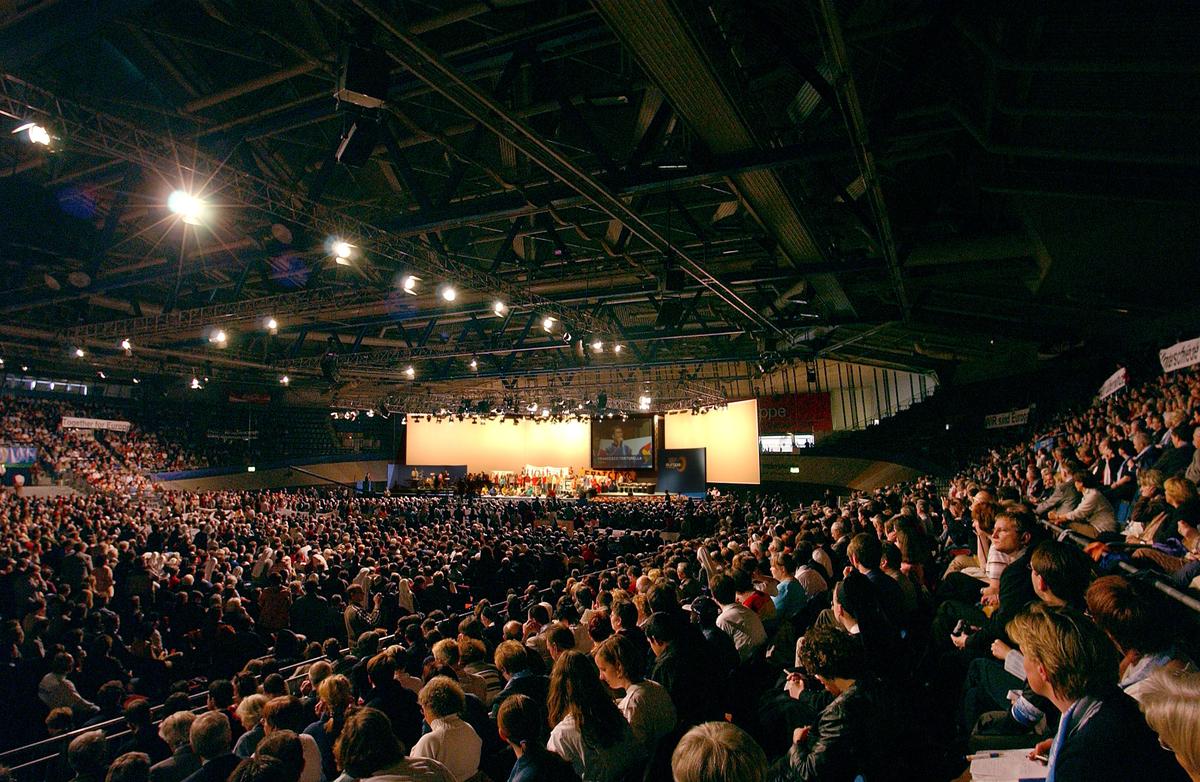 Therefore, the love I am speaking of makes no distinctions and takes into consideration all those we meet in any moment, directly or indirectly: those who are next to us physically, but also those about whom we or others are speaking; those who will receive the work we do day by day, those we come to know about through the newspapers or television…. Because this is the way God our Father loves, making the sun rise on the bad and the good, and causing the rain to fall on the just and the unjust alike (cf Mt 5:45). (…) Furthermore, the love that Jesus brought is not an idealistic, sentimental love, made up of words. It is a concrete love. It needs to be expressed with deeds. And this is possible if we make ourselves all things to all people: sick with those who are sick; joyful with those who are joyful; worried, insecure, hungry, poor with others, feeling in ourselves what they feel and acting accordingly». Chiara Lubich, Stuttgart 8th May 2004
Therefore, the love I am speaking of makes no distinctions and takes into consideration all those we meet in any moment, directly or indirectly: those who are next to us physically, but also those about whom we or others are speaking; those who will receive the work we do day by day, those we come to know about through the newspapers or television…. Because this is the way God our Father loves, making the sun rise on the bad and the good, and causing the rain to fall on the just and the unjust alike (cf Mt 5:45). (…) Furthermore, the love that Jesus brought is not an idealistic, sentimental love, made up of words. It is a concrete love. It needs to be expressed with deeds. And this is possible if we make ourselves all things to all people: sick with those who are sick; joyful with those who are joyful; worried, insecure, hungry, poor with others, feeling in ourselves what they feel and acting accordingly». Chiara Lubich, Stuttgart 8th May 2004
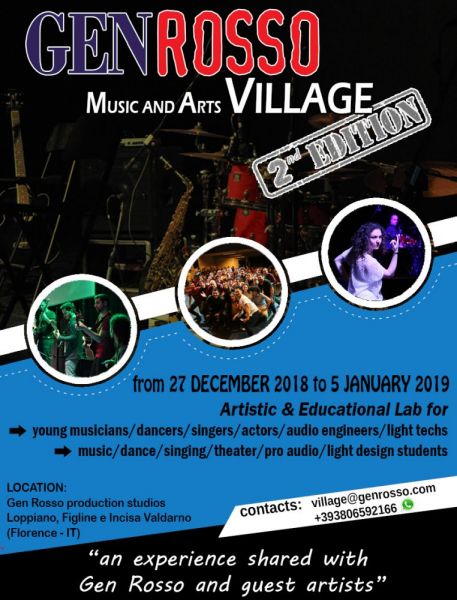
Nov 9, 2018 | Non categorizzato
 After the success of the 1st edition, Gen Rosso (International Performing Arts Group) presents the 2nd edition of “Gen Rosso Music and Arts Village“, a depeening artistic experience and a sharing of values in the light of the charism of unity. The Village, which will take place at Gen Rosso production studios in Loppiano from 27 December 2018 to 5 January 2019, intends to involve young professionals and students of various disciplines such as music, dance, vocals, theater, sound and light engineering, from 18 years old and up.A certificate of participation will be issued at the end of the program. The teaching methodology is designed and managed by Gen Rosso tutors in collaboration with teachers with recognized skills and artistic experience. The program includes the study of specific themes in the arts world, the exchange of experiences, creative spaces and practical workshops that will converge in a final performance. Contributions by professional artists are scheduled for some evenings. The Gen Rosso Village secretary is available to provide further information and all the necessary documentation for registration (limited number). Contacts Secretary VILLAGE: tel +390558339821 (9 am to 1 pm) mobile Franco Gallelli +393806592166 (24h) e-mail village@genrosso.com https://www.youtube.com/watch?v=G9eF6q1PYO4
After the success of the 1st edition, Gen Rosso (International Performing Arts Group) presents the 2nd edition of “Gen Rosso Music and Arts Village“, a depeening artistic experience and a sharing of values in the light of the charism of unity. The Village, which will take place at Gen Rosso production studios in Loppiano from 27 December 2018 to 5 January 2019, intends to involve young professionals and students of various disciplines such as music, dance, vocals, theater, sound and light engineering, from 18 years old and up.A certificate of participation will be issued at the end of the program. The teaching methodology is designed and managed by Gen Rosso tutors in collaboration with teachers with recognized skills and artistic experience. The program includes the study of specific themes in the arts world, the exchange of experiences, creative spaces and practical workshops that will converge in a final performance. Contributions by professional artists are scheduled for some evenings. The Gen Rosso Village secretary is available to provide further information and all the necessary documentation for registration (limited number). Contacts Secretary VILLAGE: tel +390558339821 (9 am to 1 pm) mobile Franco Gallelli +393806592166 (24h) e-mail village@genrosso.com https://www.youtube.com/watch?v=G9eF6q1PYO4
Nov 9, 2018 | Non categorizzato
One unforgettable night, 29 years ago, the citizens of East Berlin started to hammer down the wall that had divided them from the Western side of the city, since 13 August 1961. The Berlin wall was just a tract along the border line that divided all of Europe into two parts during the cold war: the zone under US surveillance to the west and the Soviet zone to the east Today, other walls still remain, like that between North and South Korea, and new ones have been built. These walls violate the people’s fundamental rights to health, education, employment, water and food. And which, at times separate communities and families, like those between Israel and Palestine, between Egypt and Israel, between the USA and Mexico, between India and Bangladesh, between Morocco, Algiers and Mauritius. Also in Europe new walls divide, like those between Ceuta and Mellila, or, or between Greece and Turkey. Lastly, a wall of water, is the Mediterranean sea, which continues to swallow up victims. The unexpected fall of the Berlin wall however, had triggered a hope which is still actual today: that all the walls, thanks to the commitment of man men and women of good will, may one day collapse.
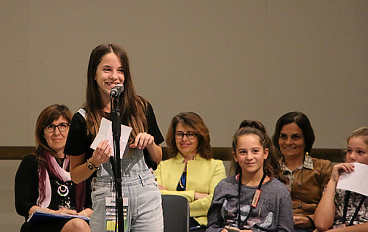
Nov 9, 2018 | Non categorizzato
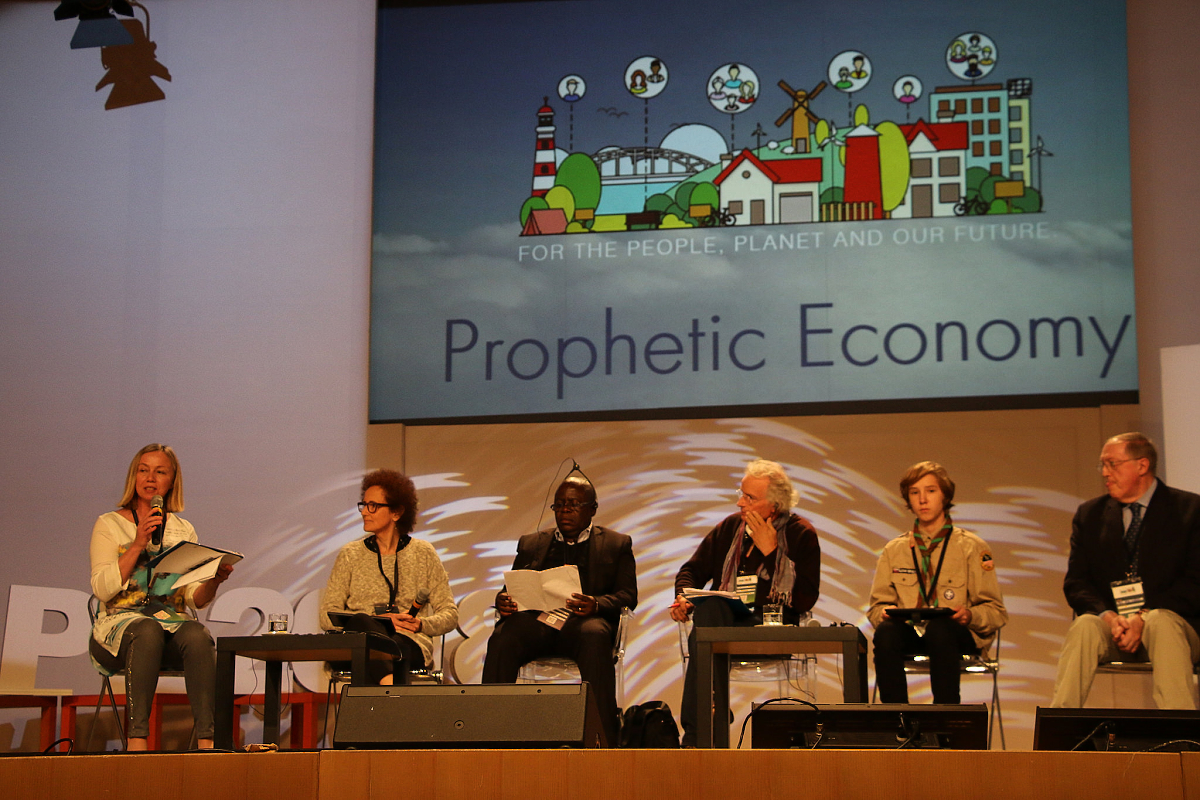 500 “Prophetic Economy” participants from 40 countries and all five continents were gathered from 2 to 4 November at the International Mariapolis Centre, CastelGandolfo, near Rome, Italy. The event facilitated interactive and intergenerational exchange through a program of inspiring contributions, work groups and creative workshops. What began as an international platform of encounter, exchange and encouragement, the event went far beyond the limits of mere networking, to become a driving force of energy and commitment for initiatives and actions at local, regional and international levels. Internationally-renowned economist Jeffrey Sachs, a key speaker at the event, affirmed, “Prophetic economy means an economy that operates in the vision of the prophets, of justice, of peace, a vision of meeting the needs of the poorest people, a vision of protecting creation.”.
500 “Prophetic Economy” participants from 40 countries and all five continents were gathered from 2 to 4 November at the International Mariapolis Centre, CastelGandolfo, near Rome, Italy. The event facilitated interactive and intergenerational exchange through a program of inspiring contributions, work groups and creative workshops. What began as an international platform of encounter, exchange and encouragement, the event went far beyond the limits of mere networking, to become a driving force of energy and commitment for initiatives and actions at local, regional and international levels. Internationally-renowned economist Jeffrey Sachs, a key speaker at the event, affirmed, “Prophetic economy means an economy that operates in the vision of the prophets, of justice, of peace, a vision of meeting the needs of the poorest people, a vision of protecting creation.”. 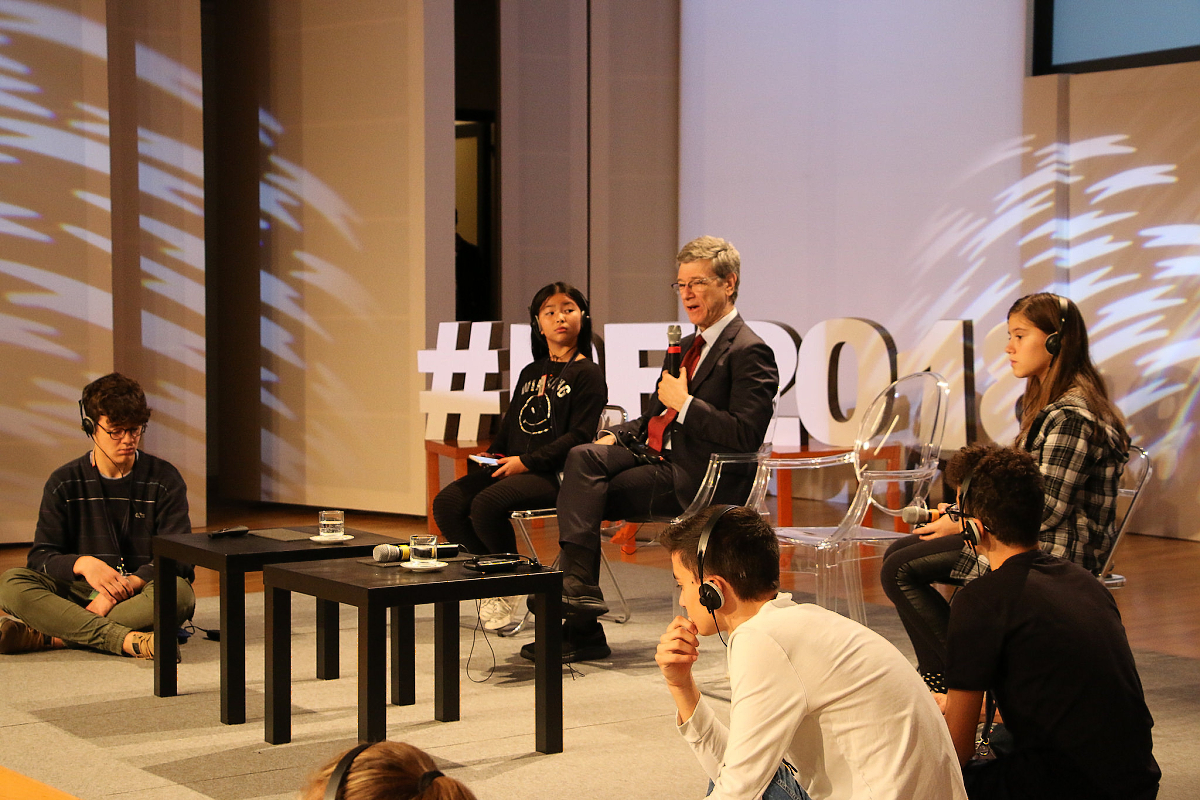 Diversity characterized the participants: economists, ecological activists, experts from the financial sector, students, entrepreneurs, people from a variety of different cultural and religious backgrounds, with a wide age range – the youngest being only 9 years old! The younger attendees were protagonists both in age-specific sessions involving interaction with experts in the fields of economy and ecology, and in cross-generational panels, contributing their own distinctive questions, proposals and life experiences. “How good it has been to have the children and young people with us” said Josiane Gauthier, Secretary General of Catholic Development Alliance CIDSE. Inspiring us with their profound intelligence and grace and truth”. The event highlighted examples of good economic practices. As Italian economist Stefano Zamagni explained, “It‘s those who look ahead and dare to gaze beyond the obstacles. The current economic and social models no longer work”. “These kind of economic practices already exist”, observed Lorna Gold, economist with Trocair, the Irish development agency, “but all too often they’re invisible in the media and our culture.”
Diversity characterized the participants: economists, ecological activists, experts from the financial sector, students, entrepreneurs, people from a variety of different cultural and religious backgrounds, with a wide age range – the youngest being only 9 years old! The younger attendees were protagonists both in age-specific sessions involving interaction with experts in the fields of economy and ecology, and in cross-generational panels, contributing their own distinctive questions, proposals and life experiences. “How good it has been to have the children and young people with us” said Josiane Gauthier, Secretary General of Catholic Development Alliance CIDSE. Inspiring us with their profound intelligence and grace and truth”. The event highlighted examples of good economic practices. As Italian economist Stefano Zamagni explained, “It‘s those who look ahead and dare to gaze beyond the obstacles. The current economic and social models no longer work”. “These kind of economic practices already exist”, observed Lorna Gold, economist with Trocair, the Irish development agency, “but all too often they’re invisible in the media and our culture.” 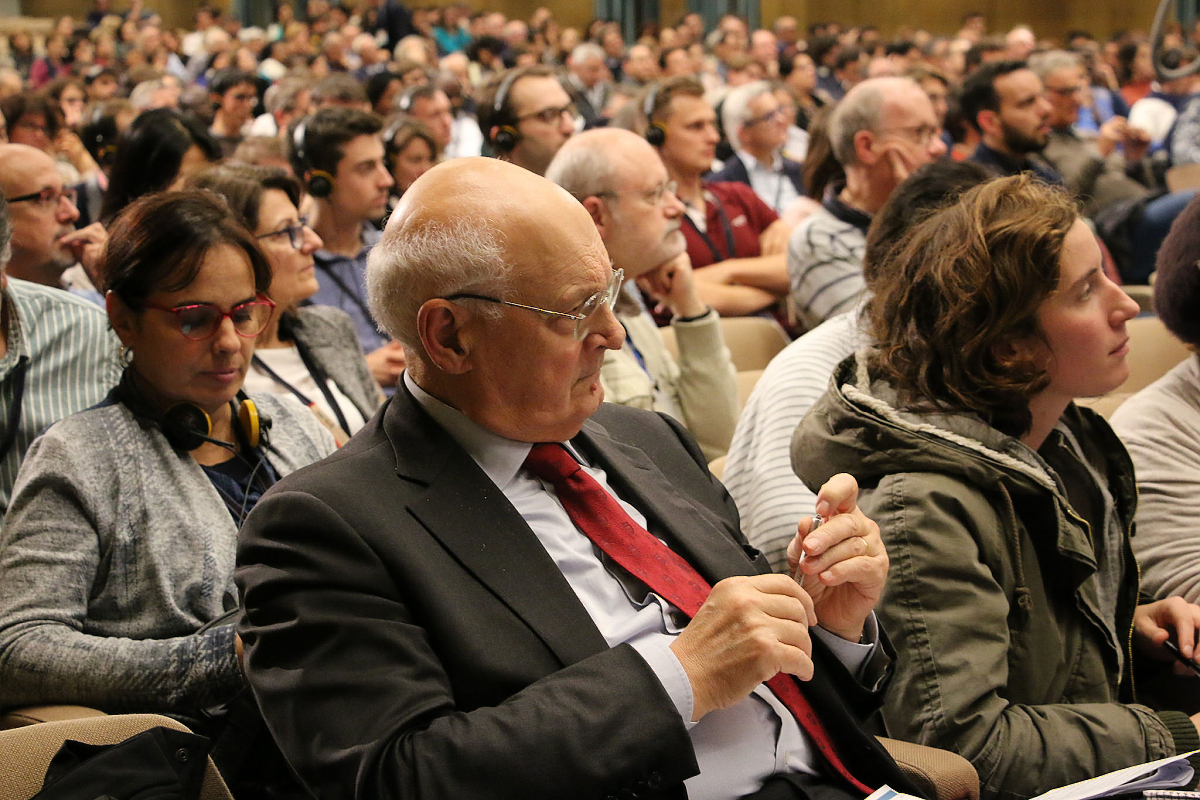 The “Prophetic Economy Award” was launched to promote good practice through examples of the prophetic economy in action. Carlo Petrini, founder of the Slow Food Movement, acknowledged the award winners. “They practice a form of economic reality different from the norm, they see beyond the pervasive economic modes. They are not so much prophetic in vision, as in their daily practice.” “This is not about utopias or ‘small islands’ within an unjust and unchanging system. Here, we’re looking at signals of tangible change,” observed Argentinean economist Cristina Calvo. “In the face of massive global financial mechanisms, we run the risk of feeling powerless. The antidote to being static is to widen the spectrum of action on all levels: micro, medium and macro.” A significant element within this event was the space given to those living in situations of poverty or social exclusion to make their own voice heard. “The time has come to rethink our economy and rethink our world, not ‘for’ the poor, not even with their participation, but starting from them,” concluded Jean Tonglet of ATD Fourth World. “Our knowledge is incomplete until it includes the knowledge of those we want to liberate from poverty, who struggle with its effects on a daily basis.” The challenge launched by this event is to invent new ways of collaboration, in order to be stronger and more creative in efforts to change to lifestyles based on a more sharing, more just and more sustainable economy. “The new idea at the basis of this event,” explained Italian economist Luigino Bruni, “was to bring ecology and economy together. In today’s world, we cannot speak of poverty without mentioning climate. One of the great messages of Pope Francis’ pontificate is the invitation to activate processes, not occupy spaces, because time is superior to space. Here, we can say that a process has been started”.
The “Prophetic Economy Award” was launched to promote good practice through examples of the prophetic economy in action. Carlo Petrini, founder of the Slow Food Movement, acknowledged the award winners. “They practice a form of economic reality different from the norm, they see beyond the pervasive economic modes. They are not so much prophetic in vision, as in their daily practice.” “This is not about utopias or ‘small islands’ within an unjust and unchanging system. Here, we’re looking at signals of tangible change,” observed Argentinean economist Cristina Calvo. “In the face of massive global financial mechanisms, we run the risk of feeling powerless. The antidote to being static is to widen the spectrum of action on all levels: micro, medium and macro.” A significant element within this event was the space given to those living in situations of poverty or social exclusion to make their own voice heard. “The time has come to rethink our economy and rethink our world, not ‘for’ the poor, not even with their participation, but starting from them,” concluded Jean Tonglet of ATD Fourth World. “Our knowledge is incomplete until it includes the knowledge of those we want to liberate from poverty, who struggle with its effects on a daily basis.” The challenge launched by this event is to invent new ways of collaboration, in order to be stronger and more creative in efforts to change to lifestyles based on a more sharing, more just and more sustainable economy. “The new idea at the basis of this event,” explained Italian economist Luigino Bruni, “was to bring ecology and economy together. In today’s world, we cannot speak of poverty without mentioning climate. One of the great messages of Pope Francis’ pontificate is the invitation to activate processes, not occupy spaces, because time is superior to space. Here, we can say that a process has been started”.  The younger participants spent time considering and embracing the challenge launched by the World Food Organization to work to eradicate hunger in the world by 2030 (#zerohunger),formulating their own proposals: – to promote the idea of a “deferred meal”, asking restaurants and bars to encourage their clients to buy an extra meal for someone in need, and issuing a #zerohunger sticker to participating businesses; – to campaign for a new subject in the school curriculum teaching the Sustainable Development Goals promoted by the United Nations. Prophetic Economy is an international project jointly run by seven organizations: Pope John XXIII Community Association, Nomadelfia, The Global Catholic Climate Movement, ATD Fourth World, Associazione Mondo di Comunità e Famiglia (World of Community and Family Association), SlotMob initiative and the international Focolare Movement represented by its Economy of Communion project and ‘Teens for Unity’ youth section.
The younger participants spent time considering and embracing the challenge launched by the World Food Organization to work to eradicate hunger in the world by 2030 (#zerohunger),formulating their own proposals: – to promote the idea of a “deferred meal”, asking restaurants and bars to encourage their clients to buy an extra meal for someone in need, and issuing a #zerohunger sticker to participating businesses; – to campaign for a new subject in the school curriculum teaching the Sustainable Development Goals promoted by the United Nations. Prophetic Economy is an international project jointly run by seven organizations: Pope John XXIII Community Association, Nomadelfia, The Global Catholic Climate Movement, ATD Fourth World, Associazione Mondo di Comunità e Famiglia (World of Community and Family Association), SlotMob initiative and the international Focolare Movement represented by its Economy of Communion project and ‘Teens for Unity’ youth section.
Photo album on Flickr 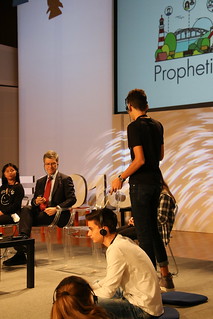
Nov 8, 2018 | Non categorizzato
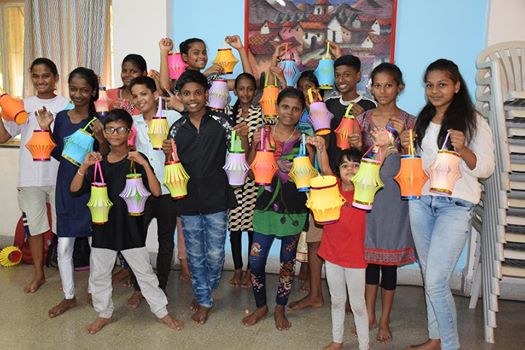
Nov 7, 2018 | Focolare Worldwide
 In India, in these days is the Festival of Light, the most important celebration of the year: Diwali. It commerates the victorious return of Rama, the manifestation of the Divinity Vishnu, in his capital, Ayodhya, after 14 years of exile and wandering. Therefore, today is a sybolic celebration of the return of the Light to its original home: the victory of good over evil. It is customary to light lamps and candles during the feast, which are traditionally called diya. In many areas of India there are light shows. Project Udisha in Mubai has invited everyone to “light a lamp on the front porch to remind us of the victory of Love, which is in our hearts and which we want to make grwo towards all, beginning with our own family.” See the Facebook page UDISHA PROGETTO MUMBAI INDIA
In India, in these days is the Festival of Light, the most important celebration of the year: Diwali. It commerates the victorious return of Rama, the manifestation of the Divinity Vishnu, in his capital, Ayodhya, after 14 years of exile and wandering. Therefore, today is a sybolic celebration of the return of the Light to its original home: the victory of good over evil. It is customary to light lamps and candles during the feast, which are traditionally called diya. In many areas of India there are light shows. Project Udisha in Mubai has invited everyone to “light a lamp on the front porch to remind us of the victory of Love, which is in our hearts and which we want to make grwo towards all, beginning with our own family.” See the Facebook page UDISHA PROGETTO MUMBAI INDIA
Nov 7, 2018 | Non categorizzato
A learning community I’m the headteacher of a school in an impoverished and isolated town with high rates of both unemployment and school absenteeism. Over the years, I have tried to create strong and deep relationships with my pupils, their families, my colleagues and all school empoyees. And I’ve had the joy of seeing a real “learning community” spring up, joined together to promote the dignity of each person, in a spirit of openness towards others. In our attempts to help our pupils not to abandon school, we have welcomed the “adoption at a distance” of pupils with their families, but we’ve also made our own contribution: setting up a traditional handcrafts workshop. This project actually attracted presidential acknowledgement. Recently ill health has forced me to limit my activities, but as long as I have breath in my body I will fight for education to help people discover their own value and the love of God. (I. – Argentina) Take on another’s pain Our family was shaken to the core by the suicide of my brother. Life was never the same again for us. I myself began to doubt my faith. My days became emptier and lost their meaning, until one day I realised that my attitude was not helping my parents at all. I gathered up all my strength in order to take on their terrible pain, so that by sharing it with them, their tragic burden might be lightened. Gradually, in this way, I found that my own wounds began to heal. It was not easy, but it’s helping me too, now that I have myself become a mother. (O.M. – Germany) Making space for others I married Marcello when I was 24 years old. We had so much in common, including our faith and we dreamed of the beautiful family we would have together. 15 years later, Marcello was taken from me in an accident. For six years I remained trapped within the unanswerable “why me”? Until the day I accepted an invitation to a meeting, where they spoke of God Love. This disturbed me but gradually the words sank in and began to change something within me. When I heard how, out of love for us, Jesus on the cross experienced abandonment from the Father, crying out “My God, why have you forsaken me?”, my own forsaken cry began to make sense. My situation did not change, I was still a widow, but within me I was able to begin to love once more. Looking around, I noticed how many people were experiencing a void as great as my own. The more I was able to make space for them, the more God filled me with His peace. (A. – Italy) Thinking of those who come after me I’m a teacher. At the end of each lesson, I try to leave the classroom in good order for those who will use the room after me. I leave the desk tidy, the teaching board clean, the windows open to let in the fresh air. Each room has two baskets for waste: one for paper and one for all other discarded items. Often, when I find them mixed up, I try to sort the rubbish so it is all in the correct basket. This means I often lose a few minutes of my break time, which should be to regain strength for my next lessons, but I believe it is definitely time “lost” well! (A. – Switzerland) Keep the conversation going When our children entered adolescence, we found it harder and harder to understand one other. This led to tensions between me and my husband because we had very different approaches to their behaviour. When we realised that our relationships with our children were under threat, with one son in particular, we understood that we had to go beyond the limits of our own ideas and set ourselves to be the first to love, constantly keeping a conversation going between us and with our children. Now they have all grown up, but we know that our role in educating our children is far from over! (Mariolina – Italy)
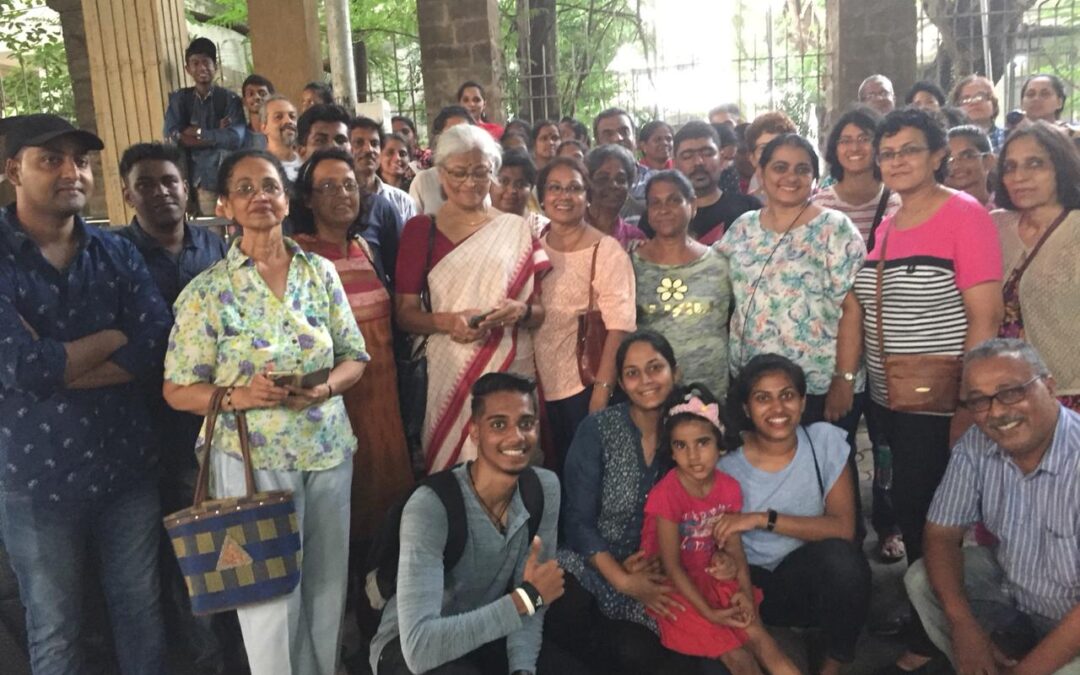
Nov 6, 2018 | Focolare Worldwide
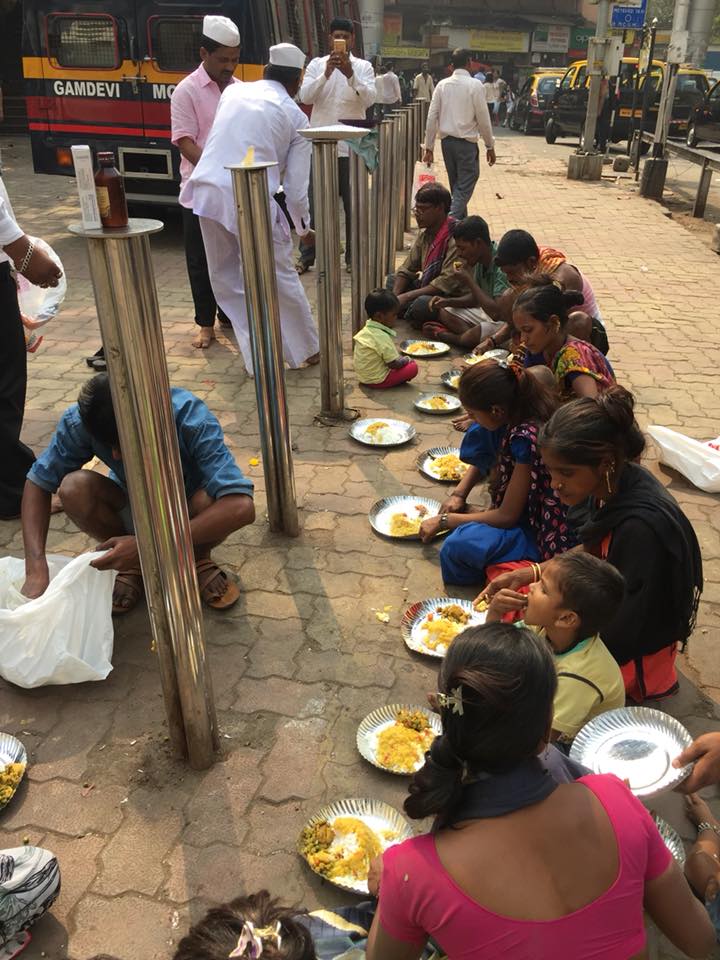 With one of the fastest growing economies, India is a country which is racing toward constant improvement in life expectancy, literacy rates and health conditions. However, of the 1.2 billion inhabitants of the country, the conditions of those living in the poorest regions are still difficult. Despite its status as an economic power, mortal malnutrition persists. Every evening in India, 200 million people try to fall asleep despite the gnawing hunger. And every day, 3,000 children die of hunger. In Mumbai, where thousands of people go for cancer treatments, Sunny of the Focolare community, wrote: “During the treatments, the families sleep on the road or around the hospital, in the lack of all necessities.” This is an alarming situation of poverty, especially if compared with the data related to the growing waste of perfectly whole foodstuffs, thrown away at the end of wedding banquets, rites, and family parties. The country is one of the world’s main producers of foodstuff, but is likewise one in which a good part of these goods are wasted. Among the causes are also the shortage of transport and warehousing systems especially the “cold chain” system: according to estimates in 2017 of the Indian Ministry of Agriculture, the value of the losses connected to foodstuff wastes (not only in terms of farming goods and foodstuffs, but also in the use of water and energy) could range between 8 and 15 billion dollars yearly.
With one of the fastest growing economies, India is a country which is racing toward constant improvement in life expectancy, literacy rates and health conditions. However, of the 1.2 billion inhabitants of the country, the conditions of those living in the poorest regions are still difficult. Despite its status as an economic power, mortal malnutrition persists. Every evening in India, 200 million people try to fall asleep despite the gnawing hunger. And every day, 3,000 children die of hunger. In Mumbai, where thousands of people go for cancer treatments, Sunny of the Focolare community, wrote: “During the treatments, the families sleep on the road or around the hospital, in the lack of all necessities.” This is an alarming situation of poverty, especially if compared with the data related to the growing waste of perfectly whole foodstuffs, thrown away at the end of wedding banquets, rites, and family parties. The country is one of the world’s main producers of foodstuff, but is likewise one in which a good part of these goods are wasted. Among the causes are also the shortage of transport and warehousing systems especially the “cold chain” system: according to estimates in 2017 of the Indian Ministry of Agriculture, the value of the losses connected to foodstuff wastes (not only in terms of farming goods and foodstuffs, but also in the use of water and energy) could range between 8 and 15 billion dollars yearly. 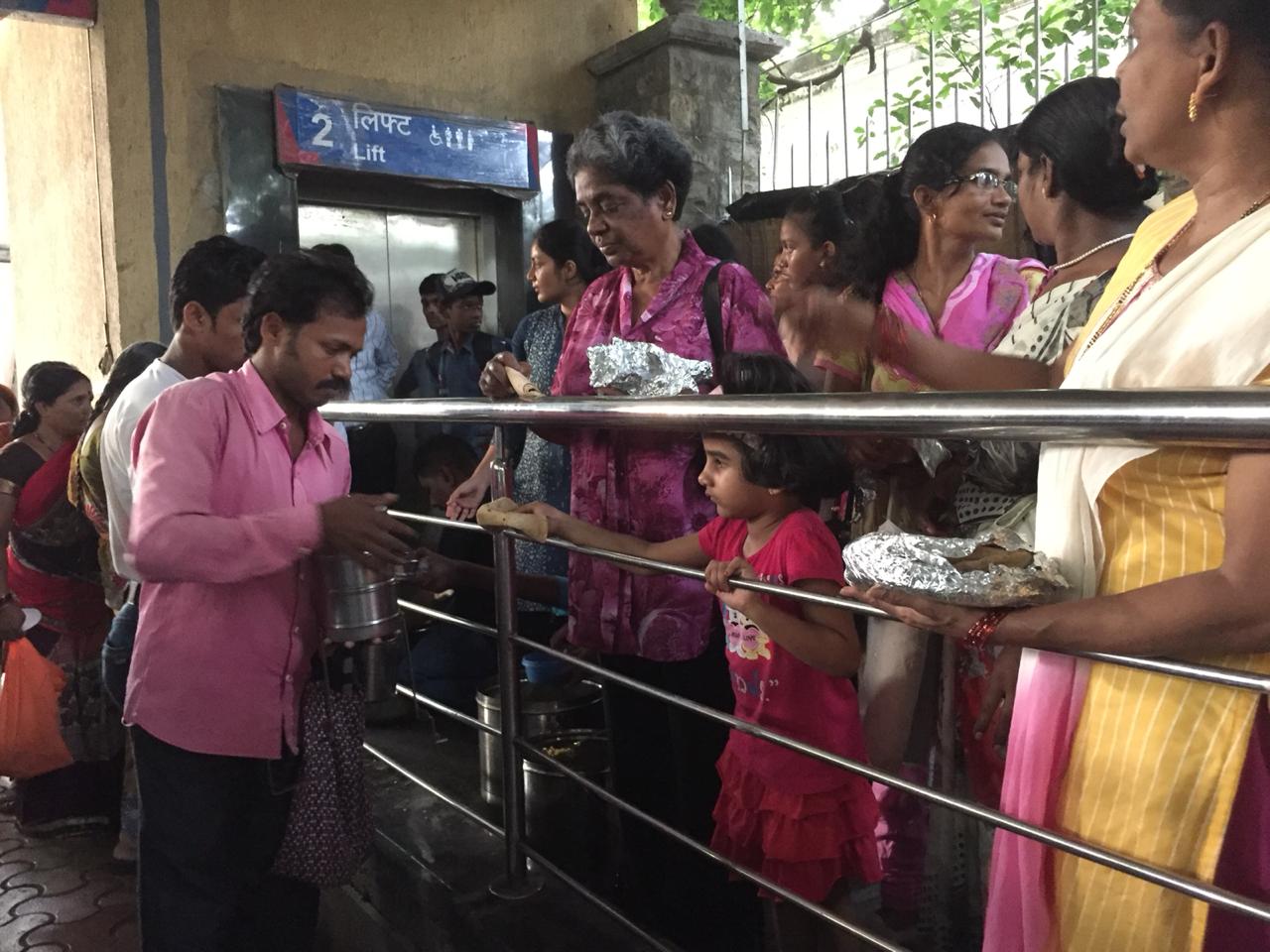 From 2017 onward the nonprofit RotiBank has been working to gather food rejects or those freshly prepared from food companies, like hotels or cafeterias, and involving them in a safe way in the slums or for homeless people. “Roti” is a typical, round Indian bread, from a dough of whole-bran flour and water, baked also on stones. After having received a van as a gift, RotiBank is now working to increase the number of vehicles and staff. Many of the people benefited are children or labourers who do not get a minimum salary to be able to survive. The non-profit initiative avails of a chain of volunteers who, after their normal work hours, participate in the collection and distribution of leftover food. “It is essential – the presentation of the initiative says – to redistribute the leftovers, and perfectly edible food intended for the dumpsite, to people who are really in need.”
From 2017 onward the nonprofit RotiBank has been working to gather food rejects or those freshly prepared from food companies, like hotels or cafeterias, and involving them in a safe way in the slums or for homeless people. “Roti” is a typical, round Indian bread, from a dough of whole-bran flour and water, baked also on stones. After having received a van as a gift, RotiBank is now working to increase the number of vehicles and staff. Many of the people benefited are children or labourers who do not get a minimum salary to be able to survive. The non-profit initiative avails of a chain of volunteers who, after their normal work hours, participate in the collection and distribution of leftover food. “It is essential – the presentation of the initiative says – to redistribute the leftovers, and perfectly edible food intended for the dumpsite, to people who are really in need.” 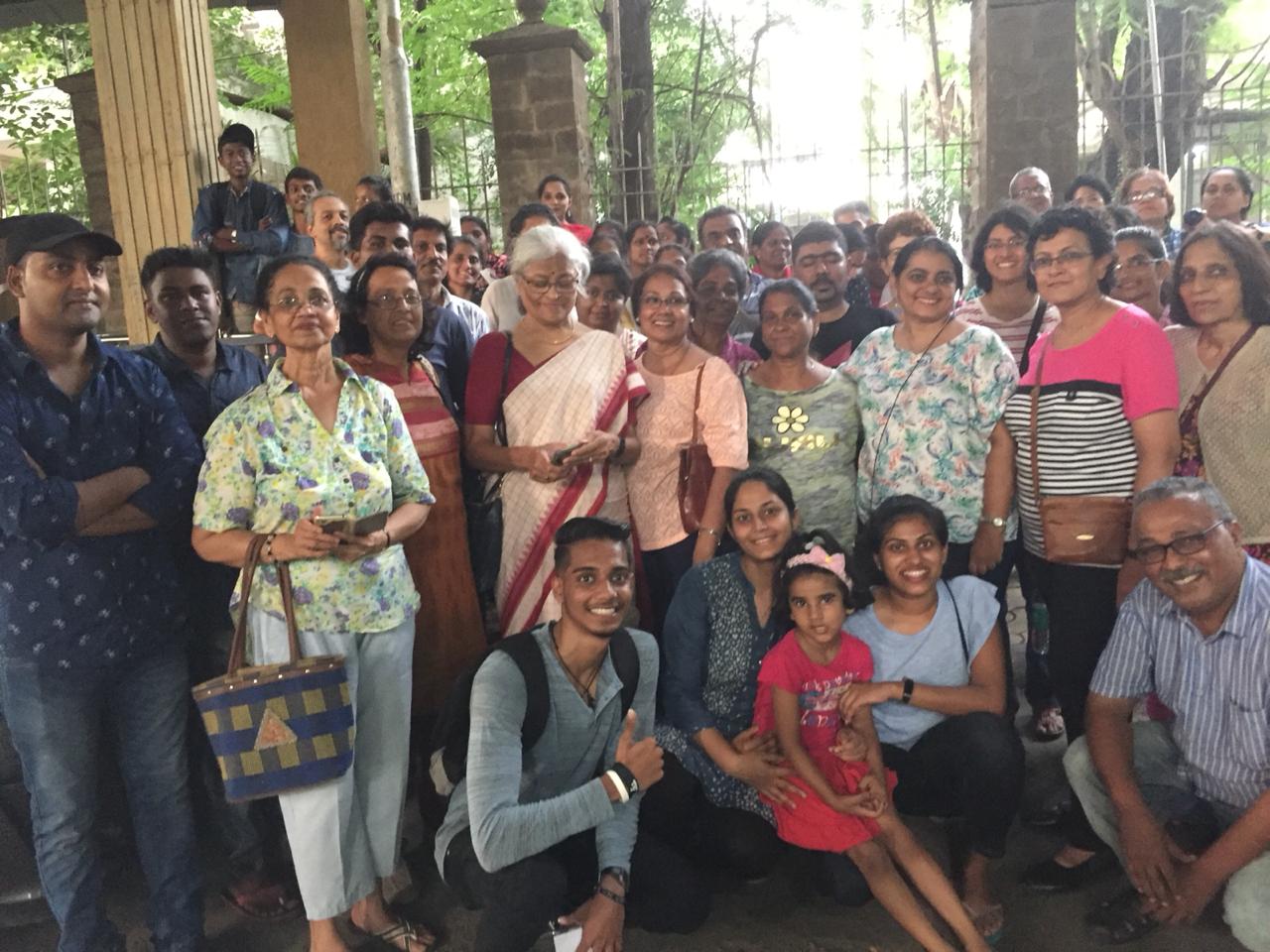 Sunny explained: “We decided to start our battle with an awareness afternoon in support of this non-profit organisation. About 45 members of the Mumbai Focolare community placed themselves at disposal to serve the meals. It was an occasion for us to verify our own shopping methods, and realise that every day we can put something aside to allow these families to have their lunch. It was moving to see how many people were waiting to receive a bit of food. One of the participants said: “I’m so happy to be part of this experience. I shall never forget the expression on the faces of the people queueing up.” Perhaps all of us should see it. Chiara Favotti
Sunny explained: “We decided to start our battle with an awareness afternoon in support of this non-profit organisation. About 45 members of the Mumbai Focolare community placed themselves at disposal to serve the meals. It was an occasion for us to verify our own shopping methods, and realise that every day we can put something aside to allow these families to have their lunch. It was moving to see how many people were waiting to receive a bit of food. One of the participants said: “I’m so happy to be part of this experience. I shall never forget the expression on the faces of the people queueing up.” Perhaps all of us should see it. Chiara Favotti
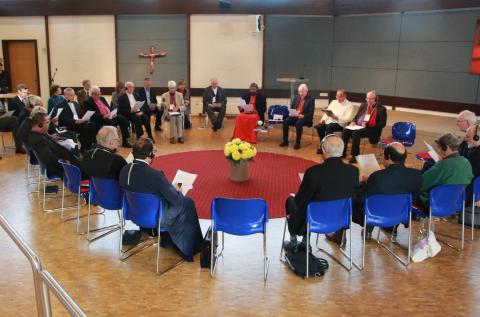
Nov 5, 2018 | Focolare Worldwide
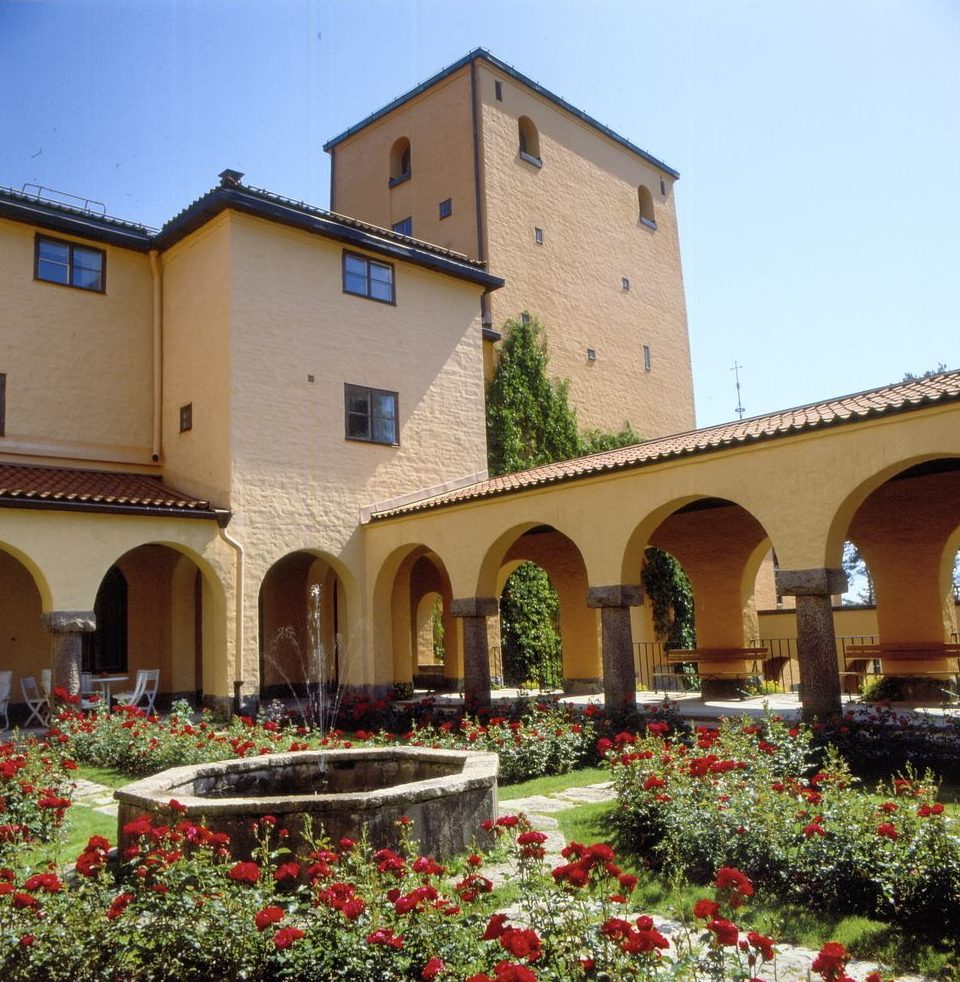 The 40 bishops, who are friends of the Focolari and come from various Christian Churches, have decided to meet in Sweden because of its profound significance in the ecumenial journey. The meeting will be taking place two years after the Lund event, one that has given a new impetus to ecumenical dialogue. In the joint declaration signed by Pope Francis and Bishop Munib Youman, who was then President of the Lutheran World Federation, one reads: “We pledge to witness together to God’s merciful grace, made visible in the crucified and risen Christ. Aware that the way we relate to one another shapes our witness to the Gospel, we commit ourselves to further growth in communion rooted in Baptism, as we seek to remove the remaining obstacles that hinder us from attaining full unity. Christ desires that we be one, so that the world may believe (cf. John 17:21)”. The periodic meetings of these bishops, who also wish to go deeper into the spirituality of unity that stemmed from Chiara Lubich’s charism, aim towards a communion that is a witness to the Gospel. They were held in Jerusalem, Constantinople (Istanbul), London, Augsburg, Katowice and other cities of significant importance in the ecumenical journey.
The 40 bishops, who are friends of the Focolari and come from various Christian Churches, have decided to meet in Sweden because of its profound significance in the ecumenial journey. The meeting will be taking place two years after the Lund event, one that has given a new impetus to ecumenical dialogue. In the joint declaration signed by Pope Francis and Bishop Munib Youman, who was then President of the Lutheran World Federation, one reads: “We pledge to witness together to God’s merciful grace, made visible in the crucified and risen Christ. Aware that the way we relate to one another shapes our witness to the Gospel, we commit ourselves to further growth in communion rooted in Baptism, as we seek to remove the remaining obstacles that hinder us from attaining full unity. Christ desires that we be one, so that the world may believe (cf. John 17:21)”. The periodic meetings of these bishops, who also wish to go deeper into the spirituality of unity that stemmed from Chiara Lubich’s charism, aim towards a communion that is a witness to the Gospel. They were held in Jerusalem, Constantinople (Istanbul), London, Augsburg, Katowice and other cities of significant importance in the ecumenical journey.  The participants attending this 37th meeting belong to 12 Christian Churches and come from 18 different countries; they will reflect on: “The Spirit’s breath of life and today’s world”. Maria Voce, president of the Focolare Movement will also be present and she will speak about “The Holy Spirit, Soul of the Church in the experience and thought of Chiara Lubich”. Other related themes will range: from the ecumenical challenge in different geographical regions to the meaning of reconciliation in today’s culture; from the Church’s renewal to synodality. Space will also be dedicated to the joint commemoration of the Reformation (2017) and its meaning for the Churches today. Stefania Tanesini
The participants attending this 37th meeting belong to 12 Christian Churches and come from 18 different countries; they will reflect on: “The Spirit’s breath of life and today’s world”. Maria Voce, president of the Focolare Movement will also be present and she will speak about “The Holy Spirit, Soul of the Church in the experience and thought of Chiara Lubich”. Other related themes will range: from the ecumenical challenge in different geographical regions to the meaning of reconciliation in today’s culture; from the Church’s renewal to synodality. Space will also be dedicated to the joint commemoration of the Reformation (2017) and its meaning for the Churches today. Stefania Tanesini
Nov 3, 2018 | Non categorizzato
“In Jesus, God simply made himself our brother. He did not only stand beside us, but he entered into us, into our hearts, into our wounds. In doing so he made the wounds of man his own, and thus the wounds that burn in humanity became God’s in this man, Jesus of Nazareth. When he says, ‘I am the way,’ all we need to do is look to the open wound in his side, and there we will find the way. This is certainly not easy; it’s not obvious, either. Yet if we try, if we attempt it, if we risk it, we will realize that he is the way.” (from a homily in 1993) “In Jesus in shows how God, who up to now in the history of his people seemed to have been silent, had not fallen asleep, had not fallen mute. He comes, gathers his poor people and takes them in. He doesn’t do it, however, with lightning action produced by his omnipotence, but in a smaller way, the way of Jesus, the hidden way of service: the way of the cross.” (from a radio interview on September 17, 1978) “Jesus was accused of being a friend to sinners and tax collectors, for having kept ‘bad company.’ His behavior certainly left himself open to misunderstandings. You might say it was a simple criticism of the established order, simple likable eccentricity, or simple protest against the establishment and fixed values. But no: for Jesus, in whom God’s heart beat, he cared for everyone and everything. He didn’t care about those on fringes just in themselves, but rather in that they were part of the whole. “He too is a son of Abraham” (Luke 19:9) is how Jesus himself justified, to the so-called ‘gentlemen’ and those who pretended an external legality, his friendship with Zacchaeus the tax collector.” (from an article in December 1973)

 «Universal brotherhood was also the project of people who were not motivated by religious motives, but simply by the desire to benefit humanity. The French Revolution’s motto: “liberty, equality, fraternity”, summarizes the great political project of modernity, a project which, in part, has been disregarded. While numerous countries have built democratic systems of government and have succeeded in achieving some degree of liberty and equality, the same cannot be said of fraternity which has been proclaimed more than it has been lived. But the one who brought fraternity as the essential gift to humanity was above all Jesus. In revealing the fatherhood of God, He broke down the walls which separate those who are “the same” from those who are “different”, friends from enemies. He loosened all people from the bonds that imprison them, from all forms of slavery and subordination, from every unjust relationship, thus carrying out an authentic existential, cultural and political revolution. (…) The instrument that Jesus offered to us in order to accomplish this universal fraternity was love, a great love, a new love, different from the one we usually know. In fact, He transplanted the way of loving of heaven here on earth. This love requires first of all that we love everyone, therefore, not only relatives and friends. It asks that we love the pleasant and the unpleasant, our fellow-countryman and the stranger, the European and the immigrant, those of our Church and of another, of our religion and of another. Today it asks the countries of Western Europe to love those of Central and Eastern Europe – and vice versa – and it asks everyone to be open to those of other continents. In the vision of its founders, in fact, Europe is a family of sister nations, not closed in itself, but open to a universal mission: Europe wants its unity to contribute, then, to the unity of the human family. This love asks that we love our enemies as well and that we forgive them if they have offended us. After the wars which stained our continent with blood, many Europeans were exemplary in loving their enemies and promoting reconciliation.
«Universal brotherhood was also the project of people who were not motivated by religious motives, but simply by the desire to benefit humanity. The French Revolution’s motto: “liberty, equality, fraternity”, summarizes the great political project of modernity, a project which, in part, has been disregarded. While numerous countries have built democratic systems of government and have succeeded in achieving some degree of liberty and equality, the same cannot be said of fraternity which has been proclaimed more than it has been lived. But the one who brought fraternity as the essential gift to humanity was above all Jesus. In revealing the fatherhood of God, He broke down the walls which separate those who are “the same” from those who are “different”, friends from enemies. He loosened all people from the bonds that imprison them, from all forms of slavery and subordination, from every unjust relationship, thus carrying out an authentic existential, cultural and political revolution. (…) The instrument that Jesus offered to us in order to accomplish this universal fraternity was love, a great love, a new love, different from the one we usually know. In fact, He transplanted the way of loving of heaven here on earth. This love requires first of all that we love everyone, therefore, not only relatives and friends. It asks that we love the pleasant and the unpleasant, our fellow-countryman and the stranger, the European and the immigrant, those of our Church and of another, of our religion and of another. Today it asks the countries of Western Europe to love those of Central and Eastern Europe – and vice versa – and it asks everyone to be open to those of other continents. In the vision of its founders, in fact, Europe is a family of sister nations, not closed in itself, but open to a universal mission: Europe wants its unity to contribute, then, to the unity of the human family. This love asks that we love our enemies as well and that we forgive them if they have offended us. After the wars which stained our continent with blood, many Europeans were exemplary in loving their enemies and promoting reconciliation.  Therefore, the love I am speaking of makes no distinctions and takes into consideration all those we meet in any moment, directly or indirectly: those who are next to us physically, but also those about whom we or others are speaking; those who will receive the work we do day by day, those we come to know about through the newspapers or television…. Because this is the way God our Father loves, making the sun rise on the bad and the good, and causing the rain to fall on the just and the unjust alike (cf Mt 5:45). (…) Furthermore, the love that Jesus brought is not an idealistic, sentimental love, made up of words. It is a concrete love. It needs to be expressed with deeds. And this is possible if we make ourselves all things to all people: sick with those who are sick; joyful with those who are joyful; worried, insecure, hungry, poor with others, feeling in ourselves what they feel and acting accordingly». Chiara Lubich, Stuttgart 8th May 2004
Therefore, the love I am speaking of makes no distinctions and takes into consideration all those we meet in any moment, directly or indirectly: those who are next to us physically, but also those about whom we or others are speaking; those who will receive the work we do day by day, those we come to know about through the newspapers or television…. Because this is the way God our Father loves, making the sun rise on the bad and the good, and causing the rain to fall on the just and the unjust alike (cf Mt 5:45). (…) Furthermore, the love that Jesus brought is not an idealistic, sentimental love, made up of words. It is a concrete love. It needs to be expressed with deeds. And this is possible if we make ourselves all things to all people: sick with those who are sick; joyful with those who are joyful; worried, insecure, hungry, poor with others, feeling in ourselves what they feel and acting accordingly». Chiara Lubich, Stuttgart 8th May 2004








 With one of the fastest growing economies, India is a country which is racing toward constant improvement in life expectancy, literacy rates and health conditions. However, of the 1.2 billion inhabitants of the country, the conditions of those living in the poorest regions are still difficult. Despite its status as an economic power, mortal malnutrition persists. Every evening in India, 200 million people try to fall asleep despite the gnawing hunger. And every day, 3,000 children die of hunger. In Mumbai, where thousands of people go for cancer treatments, Sunny of the Focolare community, wrote: “During the treatments, the families sleep on the road or around the hospital, in the lack of all necessities.” This is an alarming situation of poverty, especially if compared with the data related to the growing waste of perfectly whole foodstuffs, thrown away at the end of wedding banquets, rites, and family parties. The country is one of the world’s main producers of foodstuff, but is likewise one in which a good part of these goods are wasted. Among the causes are also the shortage of transport and warehousing systems especially the “cold chain” system: according to estimates in 2017 of the Indian Ministry of Agriculture, the value of the losses connected to foodstuff wastes (not only in terms of farming goods and foodstuffs, but also in the use of water and energy) could range between 8 and 15 billion dollars yearly.
With one of the fastest growing economies, India is a country which is racing toward constant improvement in life expectancy, literacy rates and health conditions. However, of the 1.2 billion inhabitants of the country, the conditions of those living in the poorest regions are still difficult. Despite its status as an economic power, mortal malnutrition persists. Every evening in India, 200 million people try to fall asleep despite the gnawing hunger. And every day, 3,000 children die of hunger. In Mumbai, where thousands of people go for cancer treatments, Sunny of the Focolare community, wrote: “During the treatments, the families sleep on the road or around the hospital, in the lack of all necessities.” This is an alarming situation of poverty, especially if compared with the data related to the growing waste of perfectly whole foodstuffs, thrown away at the end of wedding banquets, rites, and family parties. The country is one of the world’s main producers of foodstuff, but is likewise one in which a good part of these goods are wasted. Among the causes are also the shortage of transport and warehousing systems especially the “cold chain” system: according to estimates in 2017 of the Indian Ministry of Agriculture, the value of the losses connected to foodstuff wastes (not only in terms of farming goods and foodstuffs, but also in the use of water and energy) could range between 8 and 15 billion dollars yearly. 


 The 40 bishops, who are friends of the Focolari and come
The 40 bishops, who are friends of the Focolari and come